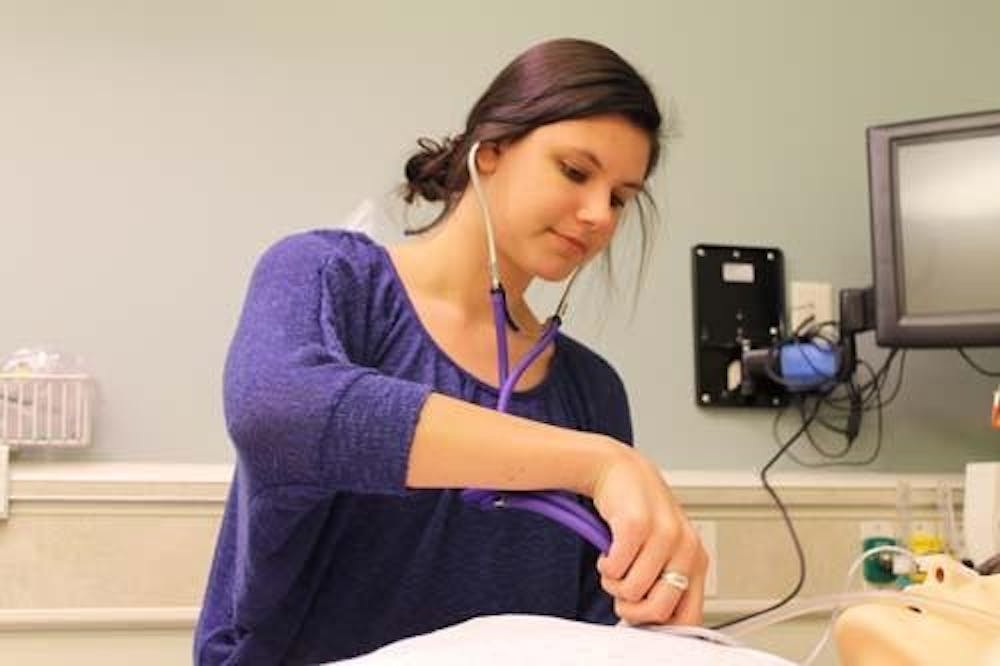Junior Jordan Anderson reacted quickly when her client had a stroke and got her medical care
Jordan Anderson, right, arrived to meet her client Kaye Exo for the first time in September. Exo was experiencing stroke symptoms when Anderson arrived, and Anderson helped her get medical care. (Photo courtesy of the Exo family)
By Taylor Tobin, Staff Writer tobint16@up.edu
Junior nursing student Jordan Anderson did not think she would be making decisions that would save her client's life when she arrived at her house back that September day.
Anderson knocked on her client's door for their first meeting. There was no response. Anderson knocked again. This time, she heard moaning from inside the house.
Her client opened the door, but instantly, Anderson knew something was wrong. This was not similar to the great chat-over-coffee interviews her friends had experienced with their clients.
"I wasn't expecting a situation like this," said Anderson. "I was just overwhelmed."
Her client, Kaye Exo, who is in her 70's, was obviously distraught.
"She wasn't dressed yet, and she looked very confused. [She] was holding her head. I asked her if she remembered about [our] appointment, or if I showed up at the wrong time," said Anderson. "She was only able to verbalize 'yes' or 'no'."
Anderson then asked if she could come inside and take a look around.
"I was looking around for anything to indicate [what had happened]," said Anderson. "I wasn't sure, because I went in not having any medical history on her, and I didn't know if she lived alone."
It turned out that Exo was living alone, and Anderson determined that her client's state was not normal.
What Anderson did next potentially saved Exo's life-she called a friend of Exo's and then 911.
Anderson said Exo's friend was concerned when Anderson explained the situation.
"She sounded really scared and concerned," Anderson said. "So I [thought], 'OK I need to call an ambulance'."
While Anderson waited with Exo, Exo still could not communicate and seemed disoriented. Anderson knew that she must stay calm for her patient.
"I wanted to make sure she knew I was going to help," Anderson said. "Inside, it was overwhelming and nerve-racking, but I just sat and waited with her."
When the paramedics arrived a few minutes later, they assessed Exo for about five minutes.
After looking around the house for signs of an accident or medication, they started questioning Anderson about where things were.
"They thought I was a home health care person, and I said, 'I'm a student. I don't know anything'," said Anderson. "They kept asking me a bunch of questions about my patient, and this was the first time I'd met her. I was really scared."
After the paramedics took Exo to the hospital, Exo's neighbor met Anderson outside the house.
Exo's neighbor told Anderson that the day prior, she had been acting completely normal-Exo had picked berries, went on a walk and got coffee with her.
After driving to the hospital, Anderson was met by her parents who were there to comfort her.
"I lost it," Anderson said. "I was crying, breaking down."
Eventually, Exo asked someone to bring Anderson to her room in the hospital.
While the doctors were doing tests on Exo, Anderson met Exo's son and daughter-in-law at the hospital. The nurse told Exo's son that Anderson had found her.
"He immediately gave me a hug," Anderson said. "It was really emotional, because nothing was wrong with his mom before this."
Anderson stayed in the hospital for about five hours. She did not leave until it had been determined that Exo had suffered from a stoke, and she was placed in the Intensive Care Unit.
Anderson believes that if she had not have arrived for the meeting that day, Exo's stroke would have been worse.
Being in UP's School of Nursing helped prepare Anderson to act in this situation, more than she ever imagined.
"I didn't realize that in the first four weeks of school, I had learned [so much]," said Anderson. "Just basic assessment skills and nursing instinct to call [911] immediately."
It was during her debrief with her professor and project adviser that Anderson realized the importance of her actions.
"They told me that step-by-step, I did it exactly correct," said Anderson. "It felt really good [to] know that I did what I was supposed to do, because at the time, I was freaking out."
Anderson is appreciative of all her professors in the nursing school for preparing her for this real-life situation.
"It's incredible [how they] teach you without it being 'here are the notes, now go study and memorize it'," said Anderson. "It's learning it in class, understanding it, and having it stick with you."
Dean of the School of Nursing, Joanne Warner explained that the professors' goal is to prepare their students to put what they learn in class into action in the chaotic context of a clinical environment. She said Anderson saved her client's life.
"Nursing is the only undergraduate [degree] where you can kill people," Warner said. "We are dealing with people's lives in powerful way."
Anderson notes that putting her classroom skills to work in a real-life situation was beneficial.
"It's something that I'm never going to forget," said Anderson.
Anderson practices in the nursing simulation room. (Giovanna Solano | THE BEACON)








